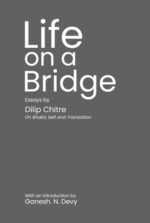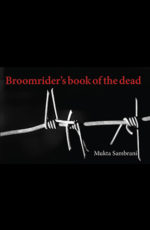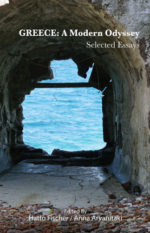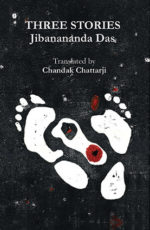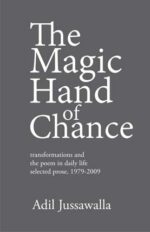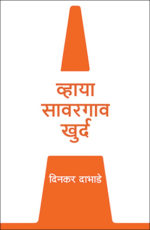| Author | |
|---|---|
| Imprint | |
| Publication Year | 2016 |
| Language | Marathi |
| Edition | 1 |
| Binding | Paperback |
| Pages | 220 |
Changlya Kavitevarchi Statutory Warning
$15
Out of stock
About the Book
Language is the most important institution of any culture. This book focuses on the rise of a new, mixed and a hybrid language which found its way by the way of its usage in the nineties in the poetry being written then. The poetry throbbed with a new vibrancy in this new language; a new style emerged in writing and changed the way poetry was written and presented to the readers. This book focuses on all the aspects of poetry written in the nineties taking into consideration the effects of the wave of globalisation, translation and more on it.
Related products
-
Life on a Bridge
$30About the Book
The essays and transcripts of Dilip Chitre brought together here are valuable in themselves as they offer a commentary on the Indian sense of tradition and the contemporary attitudes to literature. Every piece is of interest in itself. But, their greater worth lies in that they articulate the perspective of one of our most admirable poets on many issues that mattered to him. Taken together, they provide a basis for fathoming his poetry and should help us in making a more nuanced sense of it. Chitre was a fascinating poet, but it is not possible to say that his poetry was easily accessible to most of his readers. Like W. B. Yeats, he weaves in his poems experiences that arise in a given moment (such as the felling of a tree in his father’s house) together with many layers of timeless human quests and anxieties. He brings together silence and euphoria in an imagistic mix that is difficult to name with any precision. It is hence that this
volume of his comments, essays, lectures and other texts should be of importance for the lovers of Dilip Chitre’s literary works.– Ganesh N Devy
-
Broomrider’s book of the dead
$26About the Book
Mukta Sambrani’s The woman in this room isn’t lonely is a book of surprising intensity and imagination. Sambrani has a lyricism and fanciful imagination seldom seen in English-language poetry in recent decades. A poem about a man and woman in bed is anything but sentimental. Sambrani’s economy, independence of mind, hard-headedness and irony combine into a rapidly dramatic scene, which within twelve lines becomes grotesquely comic…By now there is a tradition in Indian poems of the coming of poetry as something mysterious. Sambrani’s version is totally unexpected. Bruce King, Modern Indian Poetry in English. Mukta Sambrani’s poems in Broomrider’s book of the dead are notable for their extreme strangeness. The book-length sequence is presented as the working manuscript of its fictional protagonist, Anna Albuquar, whose project is to ‘renegotiate the idea of authorship.’ There are asides, hesitations, false starts, instructions to the reader, and throughout, a steadfast regard for language. Jeet Thayil in Fulcrum and Bloodaxe book of contemporary Indian poets Broomrider’s Book of the Dead…is experimental in every sense… a crowded collage and an eloquent concoction that will make you look up all the references it states or implies…Sambrani said that her protagonist was obsessed with capturing memory “beyond constraints of time and place, beyond decay, illness and the failing of the body. She is obsessed with writing about writing. I am curious about the architecture of our experience. As we move toward a world that is hyper-digitised, our psyches become more and more of an orchestration of fragments of media, sights, sounds, words and visuals. Anna’s writing leans back to lean forward. It captures the history of writing through writing in a world that constructs itself out of fragments of media.Lora Tomas in The Sunday Guardian
-
Greece, a modern Odyssey: selected essays
$24About the Book
This outstanding collection of personal essays, sharp analysis, unusual photographs, and poetic reflections focuses on Greece and its people as they found themselves in the eye of a storm that continues to shake Europe and the world. Ranging widely from economics and politics to social and environmental issues, and from cultural and diasporic interactions to literature and the arts, the essays and other materials have been put together in ways that attract, inform, and challenge the reader no matter where she or he may reside. Presenting a roster of distinguished contributors, the editors offer a variety of perspectives, points of information, and allusions, which substantially add to ongoing debates on how individuals and groups may proceed in challenging circumstances. Greece: A Modern Odyssey is being published by Mumbai-based Paperwall Media & Publishing, in memory of the late Hatto Fischer, the German poet and philosopher who lived in Greece and brought this volume together with his wife Anna Arvanitaki.
-
Nivdak AbhidhaNantar
$50About the Book
अभिधा सुरू असताना ग्लोबलायझेशझेनची प्रक्रिया सुरू झाली होती. आमच्या काही कविता आणि याच दरम्यान स्वतःला आलेलं जगण्याचं नवं भान, ग्लोबलायझेशझेनमुळेमुळे बदललेला भोवताल आणि या सर्वांमुळे उमजलेले लिहिण्याचंही नवीन भान ह्या ‘अभिधा’मधून आम्ही दिलेल्या किंवा आम्ही मिळविलेल्या काही गोष्टी.
१९९९ मध्ये अभिधा नंतर सुरू केलं तेव्हा ग्लोबलायझेशझेनचा परिणाम असलेले साहित्य आम्ही प्रसिद्ध करू असे धोरण होते आणि २०१४ साली अभिधानंतर बंद करेपर्यंत आम्ही ते लावून धरले. ग्लोबलायझेशनंतर जीवनाप्रमाणे साहित्यही बदलत होतं. हा बदल पकडण्याचा, डॉक्युमेण्ट करण्याचा, नवीन साहित्य लोकांपर्यंत पोहोचविण्याचा उद्देश होता. हा अवकाश ग्लोबलायझेशन’नंतर’चा आणि एका अर्थाने ‘अभिधा”नंतरचा’ अवकाश होता. या पुस्तकातून अभिधानंतरमध्ये प्रकाशित झालेल्या निवडक कविता, लेख, मुलाखती आणि संपादकीय देत आहोत. या सर्व लिखाणां मधून ग्लोबलायझेशन आणि डिजिटालायझेशनंतर निरंतर बदलत असलेली भाषा, संस्कृती,आणि जगणं अधोरेखित होतं. मराठीत सध्या लिहिणाऱ्या, वाचणाऱ्या, विचार करणाऱ्या, भाषेची आणि संस्कृतीची चिंता करणाऱ्या आणि भाषेसाठी झगडणाऱ्या लोकांसाठी हे पुस्तक खूप महत्त्वाचा दस्तऐवज ठरू शकेल याची खात्री आहे.
Feeling happy to see great documentation of our work in Marathi from the late nineteen nineties. Abhidhanantar was a major movement in Marathi that self-consciously highlighted the transformation of our society and culture due to the processes of the post-1989 phase of hyper globalisation that has created the world as we understand today. Our generation was at
the cusp of the dying old analogue world that the modernist and identitarian generation of the Cold War period we had inherited, and the emergent new world of digital natives we gave birth to. Our poetry, world view and thinking documents this shift and this was the periodical that provided the platform to express this discourse. It brought together and created not only new voices like Sanjeev Khandekar, Saleel Wagh, Shridhar Tilwe, Hemant Divate, Manya Joshi, Nitin Kulkarni, Mangesh Narayanrao Kale, Arun Kale, Varjesh Solanki and Nitin Rindhe among many
others but also created a new readership in Marathi.– Sachin Ketkar
-
Three Stories – Jibanananda Das
$10About the Book
Reading Jibanananda Das’s stories is like entering straight into the middle-class Bengali mind with its desire, ambition, morbidity and despair. Through the narratives around three men whose melancholy defines the structure of these three stories, the writer re-examines the concepts of success and failure, desire and fulfillment, love and weariness, ennui and death. While the insights are those of a poet, these stories marked by Jibanananda’s deep involvement with Bengali landscape, cuisine and culture, transcend his lyrical impulse to become proper, if technically innovative, short stories with the touch of a master of the genre. Chandak Chattarji’s English versions have been able to capture the provincial setting and style of the original narratives keeping intact their nuanced psychological implications and larger insights into the human condition.’ – K. Satchidanandan ‘It has been a privilege to discover Das the writer of fiction through Chandak Chattarji’s elegant and sensitive translation of three of the master’s short stories, ‘Chhaya Nat’ (‘Shadow Play’), ‘Gram o Shohorer Galpo’ (‘Tale of City and Village’), and ‘Bilash’ (which retains its original title here).’ – Ranjit Hoskote
-
Life on a Bridge
$20About the Book
The essays of Dilip Chitre brought together here are invaluable as they offer a commentary on the Indian notion of tradition and contemporary attitudes to literature. Every piece is of interest in itself. But their greater worth lies in that they articulate the perspective of one of our most admirable poets on many issues that mattered to him. Taken together, they provide a basis for fathoming his poetry and should help us in making a more nuanced sense of it. Chitre was
a fascinating poet, but not easily accessible to most of his readers. Like W. B. Yeats, he weaves in experiences that arise at a given moment (such as the felling of a tree in his father’s house) together with many layers of timeless human quests and anxieties. He brings together silence and euphoria in an imagistic mix that is difficult to name with any precision. Hence the importance of this volume of his comments, essays, lectures and other texts for all who love Dilip Chitre’s literary works.– Ganesh N. Devy
-
The Magic Hand of Chance
$24ABOUT THE BOOK
Covering a range of subjects, mainly to do with poetry, its daily interventions, its work, this book adds to the selections of Adil Jussawalla’s prose that have appeared before: in Maps for a Mortal Moon, and in I Dreamt a Horse Fell from the Sky. In his chapter on Jussawalla in a forthcoming book, Vidyan Ravinthiran says ‘[His} time-shifts don’t feel erratic because his prose only becomes inexact when to do so seems the only option – when it comes to resisting subliminal pressures. Every sentence is saturated with thought, changes are rung on prior phrases, in a manner inspired by real-world vexations but not without an element of self-relishing play.’
Poetrywala is happy to offer you more such prose.
‘To observe, to give witness, to hold in the memory the bereaved cow, the boy who has come to deliver the groceries, the poet in transit, the little boy who wet his pants laughing and who wept because a bird died, all these pass under the Jussawalla scanner, all these are transformed by the act of writing. Jussawalla’s fight against the Indian predilection for amnesia is relentless. He will not let you forget.’ – Jerry Pinto, from his Introduction in Maps for a Mortal Moon
‘Jussawalla’s curiosity is patently omnivorous and extends far into many disciplines and knowledges, drawing not least on Parsi, Hindu and Christian sources, science and social science, local politics or birdwatching. A continual subtheme throughout is the memory of Britain and Europe in the post-war years… considered not from an outsider’s point of view but with the deepest sympathy.’
– Vivek Narayanan, from his Introduction in I Dreamt a Horse Fell from the Sky
-
Via Savargaon Khurd
$30About the Book
Via Savargaon Khurd is Dinkar Dabhade’s third novel. This novel focuses on the joys, pains, and the social issues in the lives of the rural dwellers. The writer brings to light the dilemmas, poverty and the dominance the poor suffer. The sorry plight of the farmer who faces a drought year after year; the status of women in the male-dominated society and the rampant exploitation of the weak which is prevalent.


